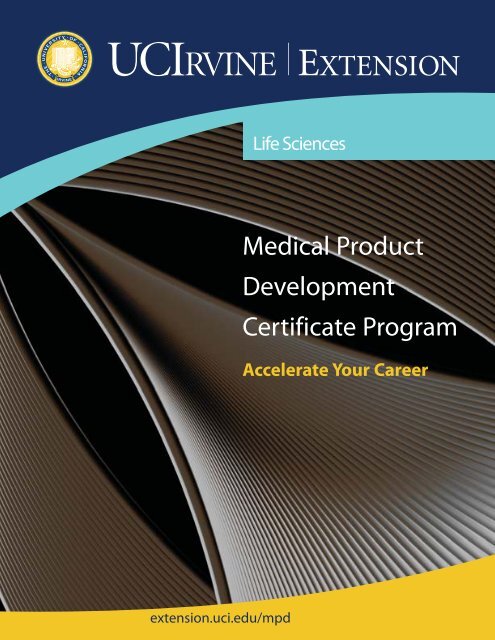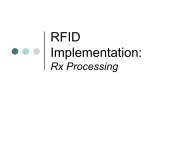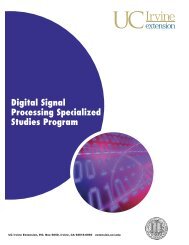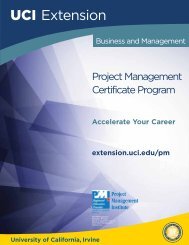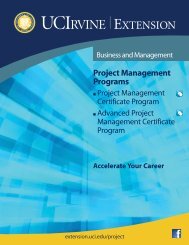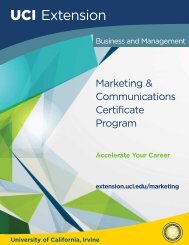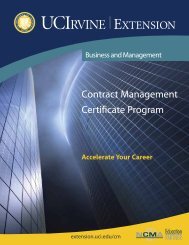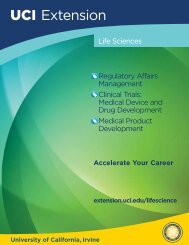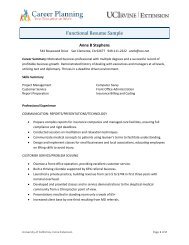Medical Product Development Certificate Program - UC Irvine ...
Medical Product Development Certificate Program - UC Irvine ...
Medical Product Development Certificate Program - UC Irvine ...
Create successful ePaper yourself
Turn your PDF publications into a flip-book with our unique Google optimized e-Paper software.
<strong>Medical</strong> <strong>Product</strong> <strong>Development</strong><strong>Certificate</strong> <strong>Program</strong><strong>UC</strong> <strong>Irvine</strong> Extension’s <strong>Medical</strong> <strong>Product</strong> <strong>Development</strong><strong>Certificate</strong> <strong>Program</strong> was developed with governmentand industry advisors. It fulfills a recognized need forcomprehensive professional learning in the successfuldesign, development and delivery of medical devices,pharmaceuticals and other biomedical products.This certificate program will benefit life sciencemanagers including research scientists and productmanagers, regulatory affairs and quality assuranceprofessionals, engineers working in biomedicalproduct design and development, manufacturingprofessionals, clinical managers and other healthcareprofessionals.Coursework addresses the breadth of the developmentprocess, including a thorough understanding of compliance,engineering for improved performance, howto mitigate commercial and financial risks and buildmarketing success.The <strong>Medical</strong> <strong>Product</strong> <strong>Development</strong> program is also aRegulatory Affairs Professional Society (RAPS) registeredprovider for professional development, and offersqualifying credits toward recertification as a RegulatoryAffairs Certified (RAC) professional.<strong>Program</strong> Benefits Gain the knowledge needed to design and createmedical devices and pharmaceuticals Acquire an understanding of the medical deviceproduct development process and knowledge neededto manage medical device intellectual property rights Learn how to implement successful medical devicedesign and manufacturing by avoiding commonquality and regulatory pitfalls<strong>Certificate</strong> RequirementsA certificate is awarded upon completion of 15 credit units(9 required and 6 elective credit units), with a grade pointaverage of “B” or better.All requirements must be completed within five (5) yearsafter the student enrolls in his/her first course.Note: Six credit units may be counted toward theClinical Trials: <strong>Medical</strong> Device and Drug<strong>Development</strong> <strong>Certificate</strong> <strong>Program</strong>.Transfer CreditGraduates from <strong>UC</strong> <strong>Irvine</strong> Extension’s <strong>Medical</strong> <strong>Product</strong><strong>Development</strong> program are eligible to transfer credits toUniversity of Nebraska-Lincoln’s Masters in EngineeringManagement.Advisory Committee Matthew Jenusaitis, President and CEO, OCTANe Dan Modi, Director, Quality & Regulatory Certification,Alcon Research, Ltd. Albert Rego, Scientific Consultant to the Life ScienceIndustry Bruce Sargeant, President, Source Scientific LLC Sumit Sen, Chemist (Technology-Based Expert), U.S.Food and Drug Administration Eric Sun, CEO, QS Labs Carl Wyrwa, Director of Quality, Beckman Coulter, Inc. Jeff Yuen, President & CEO, Jeff Yuen & Associates, Inc.OCRA members receive a 10% discount! Earn credits to qualify for RAC recertification. <strong>UC</strong><strong>Irvine</strong> Extension is a RAPS registered provider forprofessional development Learn from instructors seasoned in practical industryexperience who share their knowledge effectivelyFor more information: Jennifer Spitzer (949) 824-9722; jspitzer@uci.edu
Curriculum<strong>Certificate</strong> <strong>Program</strong> OnlineRequired Courses (9 units)<strong>Medical</strong> <strong>Product</strong> Lifecycle Management(BME X408 – 3 units)From concept through development to approval, the<strong>Medical</strong> <strong>Product</strong> Lifecycle integrates design, development,validation, and commercialization. Further your understandingof the phases, requirements, and deliverablesof the <strong>Product</strong> Lifecycle in order to manage projectsand multifunctional teams. Topics covered include DesignControl, FDA guidances, corporate procedures, start-upcompany experiences, marketing tools, concept generation,intellectual property, risk management, statistics,regulatory strategy, and time to market. Guest expertsand real world examples augment the learning experience.RAC Regulatory Requirements for <strong>Medical</strong> Devices(EECS X445.2 – 3 units)Increase your understanding of the essential U.S. medicaldevice regulations, including device classification, organizingpre-market notification 510(k), and planning and submittinga Pre-market approval (PMA). Enhance your knowledgeof topics that include: global vigilance requirements andlabeling requirements, European <strong>Medical</strong> Device Directive93/42/EEC (MDD), EU conformity assessments, meetingEU essential requirements, and developing a technical filefor the EU. Get a review of device registrations in Canada,Australia, Japan and Latin America.ORRAC Regulatory Requirements for Pharmaceutical <strong>Product</strong>s(EECS X445.26 – 3 units)This course presents a detailed overview of the regulatoryrequirements for the development and manufacture ofpharmaceutical products. Individuals involved in manufacturing,quality control, research and development, andclinical studies will learn the latest information. Exploretopics that include the product development processthrough commercialization; product characterization andpre-clinical evaluation; clinical trial requirements, goodmanufacturing practices (GMPs); good laboratory practices(GLPs); regulatory compliance inspections, labelingand advertising of medical products; and preparing regulatorysubmissions.<strong>Medical</strong> <strong>Product</strong> Quality Systems(Mgmt X442.6 – 3 units)Learn about the essential elements of Quality SystemRegulations (QSRs) and Good Manufacturing Practices(GMPs), how there is a commonality between them, andhow to develop a global approach to Quality Systemsin order to satisfy international requirements of ISO9001:2000 and ISO 13485:2003. A detailed analysis ofthese systems and practical ‘how to’ recommendationsand approaches are presented, with particular emphasison the United States Food and Drug Administration(FDA) QSRs and GMPs.BRNRACElective Courses (6 units)<strong>Medical</strong> <strong>Product</strong> Marketing(Mgmt X445 – 3 units)Getting your medical product to market successfully startsbefore product design and does not end with the productlaunch. This course focuses on what is needed to successfullymarket products within medical device and relatedindustries. Learn how to analyze the market, identify andunderstand customers and users in medical marketingindustries, and provide them with value through innovation,sales and service. Case studies and insights frompracticing medical product professionals enhance theapplication of classroom concepts.Application of Good Clinical Practices(MED X413.4 – 3 units)Gain an understanding of the accepted good principlesand practices applicable to the development and implementationof drugs and medical devices in a researchenvironment. Enhance your knowledge of topics including:definition of GCPs; the affect of GCPs on the conduct ofa clinical trial; applicable regulations from ICH, HHS, FDA,and the state; obligations of investigators, sponsors, monitors,SMOs, CROs, and IRBs in a research engagement;and compliance and accountability during a clinical trial.Learn about the basic elements of the clinical data managementprocess.Biomedical Business and Legal ManagementEssentials(BME X414 – 3 units)Increase your knowledge of business and legal issues inthe biomedical industry. Participants will learn to discernthe rationale behind policies and procedures in a highlyregulated industry. A top down approach is taken to introducebroad business and legal concepts and relating themspecifically to design, development, and commercializationof medical device and pharmaceutical products. Topicsinclude: corporate structure, corporate formation; andearly stage financing, contracts, licensing, formation,intellectual property, due diligence and sale.<strong>Medical</strong> <strong>Product</strong> Manufacturing(EECS X445.22 – 3 units)Learn about the essential manufacturing principles formedical device and pharmaceutical products, and theregulations governing the medical product manufacturingprocess. Gain valuable knowledge in understanding thekey principles, challenges and issues involved in goodmanufacturing practices (GMPs) of medical products.Topics include: product development cycle, understandingthe customer and their needs, material and processselection, packaging and sterilization, reliability testing,design validation, manufacturing process validation, anddeveloping a manufacturing strategy.For class schedule: extension.uci.edu/mpd
BRNProcess Validation for <strong>Medical</strong> <strong>Product</strong> <strong>Development</strong>(BME X407 – 3 units)Enhance your understanding of process validation andhow it is applied to the development of medical products.Learn how to assess an appropriate level of processscrutiny to provide a high level of confidence for processvalidation. Increase your knowledge of validation projectmanagement; basic approach to process validation;validation criteria for facilities and utilities; sterilization;controls, automated processes, and computer systems.Case studies illustrate how critical processes are validatedin the development of cardiovascular, ophthalmic, andintravenous devices.Design of Experiments for Superior <strong>Product</strong> andProcess Performance(EECS X429.8 – 3 units)Learn to use Design of Experiments (DOE) to dramaticallyimprove product and process innovation, effectiveness,and efficiency. DOE is the scientific approach used byresearchers to build empirical mathematical models ofproduct and process performance. These models are formulasthat can be used to optimize product and processperformance while significantly reducing costs. This software-basedcourse provides practical hands-on trainingcovering basic and advanced DOE methodology. Learnhow to: create 1st and 2nd order empirical product andprocess models; use these models and Response SurfaceMethodology (RSM) to optimize product and processperformance; reduce variation and increase robustness ofproduct and process performance by using Residual Analysis,RSM, and Dual Response Analysis; and much more.<strong>Medical</strong> Device Risk Management(BME X406 – 3 units)Get the facts you need about ISO 14971:2000 – a harmonizedstandard for <strong>Medical</strong> Device Directive 93/42/EECfor the European Union (EU), and a recognized consensusstandard for the U.S. Food and Drug Administration (FDA).Increase your understanding of the risk managementprinciples, standards, and regulations involved in medicaldevice development. A step by step guidance will helpyou achieve an understanding of ISO 14971 so that youcan implement and effectively use this complex standard.Fundamentals of Clinical Trials(BIO SCI X450 – 3 units)Clinical trials are designed to answer questions concerningthe safety and effectiveness of medical products. Get anoverview of clinical trials regulated by the FDA. Learn aboutthe planning process underlying the Strategic Clinical Planand regulatory submissions to the FDA. Explore topicsincluding protocol development and implementation, i.e.study site selection, financial controls, timelines, and managementof the site's operations; proper informed consent;Good Clinical Practices compliance; HIPAA; FDA regulationsand guidelines; and post-market support studies.Good Laboratory Practices(MED X413.41 – 1.5 units)Gain the knowledge to understand and comply with FDAGood Laboratory Practice (GLP) regulations for the conductof animal/in vitro safety studies. Enhance your understandingof topics including: regulations from the Code of FederalRegulations (CFRs), European and Japanese regulations,typical methods of compliance, how GLP fits into the drug/device/biologic development process, and ethics regardinganimal care. Learn about sponsor obligations and how toevaluate a contract laboratory. Visit a clinical researchcenter to reinforce the importance of GLP guidelines andcompliance.BRN Applied Anatomy and Physiology for Clinical Studies(BME X405 – 4 units)Whether designing investigational drugs and medicaldevices or conducting clinical trials, it is important to havea basic understanding of the form and function of thehuman body. Learn about human anatomy and physiologyas related to pharmaceuticals and medical device designfor clinical studies. Clinical examples and modeling techniquesare used to demonstrate the applications of anatomyand physiology in the development of investigational drugsand medical devices. Course focus is on human safety inclinical studies.<strong>Medical</strong> Device Design and Evaluation(EECS X445.23 – 3 units)Explore the opportunities and need for medical devicesthrough the examination of mortality and morbidity withspecial attention to medical problems that affect patients’productivity. A market and need-driven systems engineeringapproach is applied to the examination of medicaldevice design. The designs of medical devices are thenstudied through a layered approach of examining theunderlying physiological mechanisms, the applicablebiomedical sensors and actuators, as well as the controlprocessing power requirements. Exemplary medical devicesolutions are studied.On-site training available through corporate training (949) 824-1847


